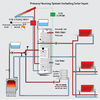When I was a lad and mother was baking it was common the hear the water boiling, and I would be sent to run off some hot water, the header tank was steel so no chance of not standing the heat the only danger was the water running out of the overflow onto the drive.
It was a pain as it would trip out the over temperature on the immersion heater, so next time we wanted it we needed to reset it, but a coke fired cooker can produce a lot of heat.
But why the domestic hot water was not heated with a coil inside the cylinder rather than using it direct from the cylinder I don't know, may be hot coils were not that good back then. To get hot water at mains pressure there is no need to pressurise the whole tank, this diagram

shows how hot coils can both put heat into a common tank and remove it from a common tank, however to have an efficient heat exchanger needs a lot of surface area, and the tank would be expensive as a result, however by putting the different functions at different levels it allows DHW to be cooler or hotter than the central heating water. Having the mains pressure hot water in the coil rather than in the main tank means there is no water reserve, if mains hot water fails there is nothing, however even if there is water in the cylinder it does not really help as unless it can draw in air it will not come out. And as water is heated it releases any air in the water, so some means to bleed off the air is also required.
So as an electrician my question is why is the tank pressurised, I have never worked it out. The same question arises with the boilers, my dad worked in a power station with water tube boilers, if a tube leaked it sprayed water or steam on the fire, but at work they have fire tube boilers, and the whole of the boiler has water and steam at around 180°C more with the older boilers which use super heated steam.
All railway engines seemed to have been made with fire tube boilers, but cars often had flash boilers which were less dangerous in a crash. Although it seems Richard Trevithick did not use a flash boiler as it seems it blow up while in the Pub.
James Watt was rather critical of using high pressure steam, but our railways would not have worked by simply condensing steam.
We hope the plumber who sets up the system gets it right, however both the Emma Shaw case and Rhianna Hardie would both likely be alive today had the plumber and electrician got it right. The problem is a mixture of trades, and so easy for the wrong type of immersion heater, header tank, or even not glueing the tun dish can result in disaster. Accidents are normally caused by many faults adding up, whole idea of using a thermal plastic header tank to me seems flawed, should be thermal setting type, if using plastic.
But we try to do things on the cheap, and only rental property gets a regular electric, and gas inspection, I was in my house for around 20 years before I had need to remove my gas fire for maintenance only to find a hole the size of my fist in the flue, so fumes could get into the room since the day we moved in, as a new build never even considered it would not be right. Father-in-laws house the gas safe guy sealed the flue with sticky tape, which soon peeled off.
Yes our own fault we should get a gas and electric inspection done on a regular basis, but we don't, and the inspector should check not only for gas leaks but also flue gas leaks, I noted my oil guy did, but never saw a gas guy check the flue in the same way.
As
@Hugh Jaleak says we should have the pressurised system tested every year, but how many do? Far safer to have the tank gravity pressure only.


